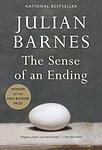Julian Barnes
Julian Barnes is an acclaimed British author known for his novels, essays, and short stories. His works often explore themes such as truth, history, love, and art. Notable works include 'Flaubert's Parrot', 'A History of the World in 10 1/2 Chapters', and 'The Sense of an Ending', which won the Man Booker Prize in 2011. Barnes' writing is characterized by its wit, intellectual rigor, and deep emotional insight.
Books
This list of books are ONLY the books that have been ranked on the lists that are aggregated on this site. This is not a comprehensive list of all books by this author.
-
1. Flaubert's Parrot
The novel centers around a retired doctor's obsession with the life and works of Gustave Flaubert, a 19th-century French writer. The doctor's fascination leads him on a quest to find a stuffed parrot that once belonged to the writer. The novel is a blend of biography, literary criticism, and personal memoir, and it explores themes such as the nature of art and the difficulties of interpreting the past.
-
2. The Sense of an Ending
This novel revolves around a middle-aged man, Tony Webster, who is forced to reevaluate his understanding of his past when he unexpectedly receives a lawyer's letter that drags him back into his complex history with his university friends, Adrian and Veronica. The book explores themes of memory, history, and time, showing how our understanding of the past can be distorted by our own perceptions and emotions. As Tony delves into his past, he realizes that his memories may not be as accurate as he once believed, leading to a surprising revelation.
-
3. A History Of The World In 10 1/2 Chapters
This book presents an unconventional and imaginative exploration of world history, weaving together a series of narratives that span different epochs, from the biblical story of Noah's Ark to the aftermath of the Chernobyl disaster. Through a blend of fact, fiction, and speculative thought, the chapters delve into various themes such as love, survival, and the nature of historical truth. Employing a variety of styles and perspectives, including that of a woodworm, the narrative challenges traditional historical narratives and invites readers to question the subjective nature of history and the stories we are told. This inventive approach to storytelling offers a unique and reflective look at humanity's past, present, and future.
-
4. Nothing to be Frightened Of
This book is a memoir that explores the author's fear of death and his quest for meaning in life. It blends elements of autobiography, philosophy, and literary criticism, drawing on the author's personal experiences, his relationships with his family, and his thoughts on writers and philosophers who have influenced him. The narrative is marked by the author's wit, humor, and keen observations, offering a thoughtful and engaging exploration of mortality and the human condition.
-
5. Arthur And George
The novel delves into the lives of two very different men at the turn of the 20th century in England: Arthur, a celebrated writer with a penchant for spiritualism, and George, a reserved solicitor of half-Indian descent who becomes embroiled in a notorious legal case. When George is wrongfully accused and convicted of a series of crimes, Arthur becomes intrigued by his plight and is compelled to use his detective skills to unravel the truth. Their stories converge as Arthur seeks to restore George's reputation in a society rife with prejudice and injustice, exploring themes of identity, the legal system, and the complexities of human character.
-
6. Levels of Life
This introspective and deeply moving book is a three-part meditation on love, loss, and the nature of grief. The first part explores the history of ballooning and photography, the second tells a fictional tale of a love affair between two balloonists in the 19th century, and the third part is a poignant memoir of the author's grief following the death of his wife. The book beautifully intertwines these threads to explore the profound impact of love and the deep pain of loss, while offering a raw and honest look at the grieving process.





